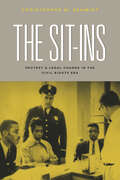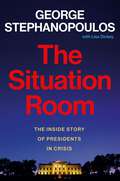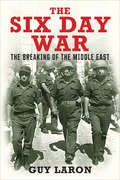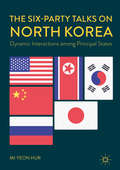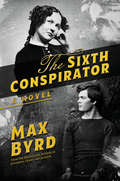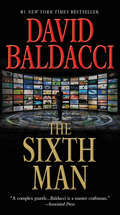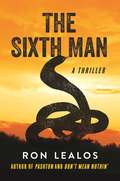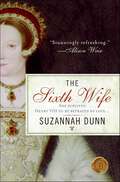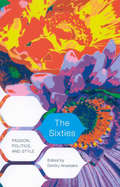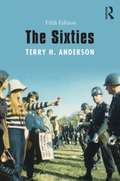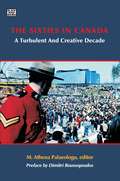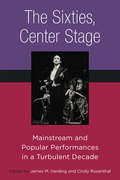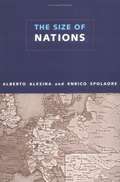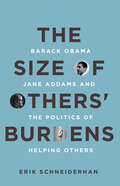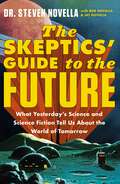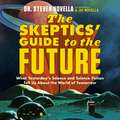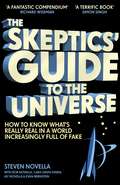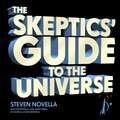- Table View
- List View
The Sisters of Henry VIII: The Tumultuous Lives of Margaret of Scotland and Mary of France
by Maria PerryHenry VIII's sisters, neglected by generations of historians, impacted the lives and perceptions of their contemporaries more forcefully than did any of their brother's famous six wives. Maria Perry examines the lives of these extraordinary women and analyzes their influence on European Tudor Age history. Both Margaret and Mary, initially accepted their status as pawns in the dynastic power struggles that raged across sixteenth-century Europe. Margaret became queen of Scotland at age thirteen; family members arranged beautiful Mary's betrothal to the aging King of France when she was twelve. But both women chose their second husbands for love. Margaret bucked convention by marrying and divorcing twice after Henry's advancing armies slaughtered her first husband and kidnapped her children. Mary risked execution by proposing to the handsome Duke of Suffolk. By illuminating the characters of these two historical figures, Perry casts light on other aspects of Tudor England, offering a fresh interpretation of Henry VIII's upbringing and of his relationship with immediate family members. In this eye-opening expose of the intrigue and scandal that simmered just beneath the Tudors' regal image, Perry reveals striking new information about a family that - more than any other - shaped the development of both Reformation England and the modern world. She delivers a new and entirely viable theory about what transpired on the wedding night of Henry's doomed elder brother, Arthur, England's heir apparent, and she presents her own spectacular findings on Henry's illegitimate son, his "worldly jewel," the shadowy Duke of Richmond. Perry rescues two remarkable princesses from the shadows of history and radically challenges popular views of both the king and his era. Actress and writer MARIA PERRY was educated at Somerville College, Oxford. Following a career in journalism, both in England and in Sweden, she undertook a wide spectrum of roles on stage and television and in film. She is a founding member of the London recording group The Poetry People. Her previous books, The Word of a Prince: A Life of Elizabeth I and Knightbridge Woman, both received high acclaim. She lives in London.
The Sit-Ins: Protest and Legal Change in the Civil Rights Era (Chicago Series in Law and Society)
by Christopher W. SchmidtOn February 1, 1960, four African American college students entered the Woolworth department store in Greensboro, North Carolina, and sat down at the lunch counter. This lunch counter, like most in the American South, refused to serve black customers. The four students remained in their seats until the store closed. In the following days, they returned, joined by growing numbers of fellow students. These “sit-in” demonstrations soon spread to other southern cities, drawing in thousands of students and coalescing into a protest movement that would transform the struggle for racial equality. The Sit-Ins tells the story of the student lunch counter protests and the national debate they sparked over the meaning of the constitutional right of all Americans to equal protection of the law. Christopher W. Schmidt describes how behind the now-iconic scenes of African American college students sitting in quiet defiance at “whites only” lunch counters lies a series of underappreciated legal dilemmas—about the meaning of the Constitution, the capacity of legal institutions to remedy different forms of injustice, and the relationship between legal reform and social change. The students’ actions initiated a national conversation over whether the Constitution’s equal protection clause extended to the activities of private businesses that served the general public. The courts, the traditional focal point for accounts of constitutional disputes, played an important but ultimately secondary role in this story. The great victory of the sit-in movement came not in the Supreme Court, but in Congress, with the passage of the Civil Rights Act of 1964, landmark legislation that recognized the right African American students had claimed for themselves four years earlier. The Sit-Ins invites a broader understanding of how Americans contest and construct the meaning of their Constitution.
The Situation Room: The Inside Story of Presidents in Crisis
by George StephanopoulosGeorge Stephanopoulos, the legendary political news host and former advisor to President Clinton, recounts the history-making crises from the place where twelve presidents made their highest-pressure decisions: the White House Situation Room. <P><P> No room better defines American power and its role in the world than the White House Situation Room. And yet, none is more shrouded in secrecy and mystery. Created under President Kennedy, the Sit Room has been the epicenter of crisis management for presidents for more than six decades. Time and again, the decisions made within the Sit Room complex affect the lives of every person on this planet. Detailing close calls made and disasters narrowly averted, THE SITUATION ROOM will take readers through dramatic turning points in a dozen presidential administrations, including: <P><P> Incredible minute-by-minute transcripts from the Sit Room after both Presidents Kennedy and Reagan were shot <P>The shocking moment when Henry Kissinger raised the military alert level to DEFCON III while President Nixon was drunk in the White House residence <P>The extraordinary scene when President Carter asked for help from secret government psychics to rescue American hostages in Iran <P>A vivid retelling of the harrowing hours during the 9/11 attack <P>New details from Obama administration officials leading up to the raid on Osama Bin Laden <P>And a first-ever account of January 6th from the staff inside the Sit Room <P><P> THE SITUATION ROOM is the definitive, past-the-security-clearance look at the room where it happened, and the people—the famous and those you've never heard of—who have made history within its walls. <p> <b>New York Times Bestseller</b>
The Six Day War: The Breaking of the Middle East
by Guy LaronThe author of Origins of the Suez Crisis &“mak[es] us look afresh at the events that led to conflict between Israel and its neighbors&” (Financial Times). One fateful week in June 1967 redrew the map of the Middle East. Many scholars have documented how the Six-Day War unfolded, but little has been done to explain why the conflict happened at all. Now, historian Guy Laron refutes the widely accepted belief that the war was merely the result of regional friction, revealing the crucial roles played by American and Soviet policies in the face of an encroaching global economic crisis, and restoring Syria&’s often overlooked centrality to events leading up to the hostilities. The Six-Day War effectively sowed the seeds for the downfall of Arab nationalism, the growth of Islamic extremism, and the animosity between Jews and Palestinians. In this important new work, Laron&’s fresh interdisciplinary perspective and extensive archival research offer a significant reassessment of a conflict—and the trigger-happy generals behind it—that continues to shape the modern world. &“Challenging . . . well worth reading.&”—Moment &“A penetrating study of a conflict that, although brief, helped establish a Middle Eastern template that is operational today . . . The author looks beyond Cold War maneuvering to examine the conflict in other lights . . . Readers with an interest in Middle Eastern geopolitics will find much of value.&”—Kirkus Reviews
The Six Queens of Henry VIII
by Honor Cargill-MartinWe all know Henry VIII had six wives. But these ladies are FAR too interesting to only be known as wives. Did you know that Catherine of Aragon rallied her troops in full armour while heavily pregnant? Or that Anne of Cleves met Henry VIII BEFORE they married - only she didn't realise, because he was in disguise! Or that it was Catherine Parr who persuaded the king to return his daughters Mary and Elizabeth - two of British history's most famous monarchs - to the line of succession?Get ready to lose your head as the six wonderful women behind the man take centre stage to overthrow her-story. From rumours of scandals and LOTS of lying, to political plays and fabulous frocks, The Six is a story filled with ambition, treason and strong women.
The Six Wives of Henry VIII
by Gladys MalvernGladys Malvern uses her celebrated talent for prose to share the stories of Henry VIII's wives with immense personality and captivating drama. Henry VIII was married to six women during his reign as the King of England. Gladys Malvern characterizes them as The Saint (Catherine of Aragon); The Egotist (Anne Boleyn); The Diplomat (Jane Seymour); The Housewife (Anne of Cleves); The Coquette (Catherine Howard); and The Mother (Catherine Parr). Malvern masterfully tells each of their personal histories and how they intertwined through rivalry, vying for power, political maneuvering, and the hardships of losing favor with the man that seceded the Church of England from Rome for a divorce.
The Six-Party Talks on North Korea: Dynamic Interactions among Principal States
by Mi-Yeon HurThe book traces the past decade of dynamic interactions among the concerned states involved in the Six-Party Talks on North Korean nuclear programs. Unlike existing studies which usually dissect incidents of the talks, the book provides a comprehensive systemic analysis of the Six-Party Talks process from A to Z. These new insights into the nuclear drama in the Northeast Asian region will be of value to scholars, policy makers, and analysts.
The Six-Shooter State: Public and Private Violence in American Politics
by Jonathan ObertAmerican violence is schizophrenic. On the one hand, many Americans support the creation of a powerful bureaucracy of coercion made up of police and military forces in order to provide public security. At the same time, many of those citizens also demand the private right to protect their own families, home, and property. This book diagnoses this schizophrenia as a product of a distinctive institutional history, in which private forms of violence - vigilantes, private detectives, mercenary gunfighters - emerged in concert with the creation of new public and state forms of violence such as police departments or the National Guard. This dual public and private face of American violence resulted from the upending of a tradition of republican governance, in which public security had been indistinguishable from private effort, by the nineteenth-century social transformations of the Civil War and the Market Revolution.
The Sixth Conspirator: A Novel
by Max ByrdThe author of Shooting the Sun blends a spy story with a love story in this tale of the secret mission to find the conspirators in Lincoln’s assassination.The assassination of Abraham Lincoln set off a hysterical burst of international conspiracy theories, with all eyes turning first to Canada—once a hotbed of Confederate plots—and then, as evidence mounted, to the Catholic Church and Rome . . .Now from bestselling author, Max Byrd, comes a long forgotten true story: a confidential mission to track down and capture any Europeans (and fugitive Confederates) who may have aided John Wilkes Booth.Drawn from State Department archives and personal letters and diaries, The Sixth Conspirator recounts the dramatic journey of George H. Sharpe, General Ulysses S. Grant’s real-life spymaster, to three European capitals. Three people travel with him—calculating banker Daniel Keach, Sharpe’s Civil War protegé Quintus Oakes, and former Pinkerton agent Maggie Lawton.One step ahead of them is a mysterious Confederate courier, Sarah Slater, known during the war as “the Veiled Lady,” who may or may not have been Booth’s lover. Behind Sharpe’s team, breathing grimly over their shoulders, are Secretary of State William Seward, brutally mutilated by the knife of one of Booth’s henchmen, and the perversely vengeful, guilt-ridden Secretary of War Edwin Stanton.Along the way Byrd creates a panorama of wonderfully realized characters, great and small, fictional and real. In deeply researched, fascinating historical detail, he carries us back to another reality—the far away mid-nineteenth century world from which our America slowly emerged.Praise for The Sixth Conspirator“From its brilliant and devastating opening scene to its surprising and breakneck conclusion, The Sixth Conspirator takes the last tendril of the Lincoln assassination and weaves it into a compelling, erudite, witty, and wise novel that should secure Max Byrd's place among the premier writers of historical fiction working today. Not to be missed!” —John Lescroart, New York Times–bestselling author of The Rule of Law and The Missing Piece“Taking us through the hideaways and haunts of European capitals in the mid-nineteenth century, this intriguing historical mystery . . . keeps us guessing right up to the last page. As in his highly acclaimed novels, Jefferson, Jackson, and Grant, Max Byrd tells the tale with witty and fast-paced writing that kept me turning pages— eager to know more about the “real” men and women of the era along with the fictional characters of his creation.” —Cokie Roberts, Emmy-winning political commentator and author of Capital Dames: The Civil War and the Women of Washington
The Sixth Man (King & Maxwell Series #5)
by David BaldacciIn the #1 New York Times bestselling thriller that inspired the TV series King & Maxwell, two private investigators dig into a killer's past--but when their search threatens powerful enemies, it could cost them their lives.Edgar Roy--an alleged serial killer--is awaiting trial. He faces almost certain conviction. Sean King and Michelle Maxwell are called in by Roy's attorney, Sean's old friend and mentor Ted Bergin, to help work the case. But their investigation is derailed when Sean and Michelle find Bergin murdered.It is now up to them to ask the questions no one seems to want answered: Is Roy a killer? Who murdered Bergin? The more they dig into Roy's past, the more they encounter obstacles, half-truths, dead-ends, false friends, and escalating threats from every direction. Their persistence puts them on a collision course with the highest levels of the government and the darkest corners of power. In a terrifying confrontation that will push Sean and Michelle to their limits, the duo may be permanently parted.
The Sixth Man: A Thriller
by Ron LealosA quick wit and a sharp tongue alone won’t be enough for Captain Chyang Fang to survive this case. Someone is murdering high-ranking Vietnamese government officials, so the head of Saigon’s homicide division, Captain Chyang Fang, a troubled Chinese Vietnamese man, is given the task of finding the killer. Hated by almost everyone in Saigon and an outcast in both Chinese and Vietnamese circles, Fang has to rely on his wit, biting sarcasm, and not-so-capable assistant, Sergeant Phan?a man who would rather play on his smartphone than work?to find the killer who leaves toy cobras on the bodies of his victims. With the aid of a hunchbacked coroner who honed his skills watching episodes of CSI, and following a key lead that stretches back to the days of the Vietnam War, Fang is led on an opium-addled journey through modern-day Saigon, and if the killer doesn’t get him, the city and its people surely will. Skyhorse Publishing, as well as our Arcade, Yucca, and Good Books imprints, are proud to publish a broad range of books for readers interested in fiction?novels, novellas, political and medical thrillers, comedy, satire, historical fiction, romance, erotic and love stories, mystery, classic literature, folklore and mythology, literary classics including Shakespeare, Dumas, Wilde, Cather, and much more. While not every title we publish becomes a New York Times bestseller or a national bestseller, we are committed to books on subjects that are sometimes overlooked and to authors whose work might not otherwise find a home.
The Sixth Wife: A Novel
by Suzannah DunnA gripping novel of love, passion, betrayal, and heartbreak in the unstable Tudor court following the death of King Henry VIIIClever, level-headed Katherine Parr has suffered through four years of marriage to the aging and irascible King Henry VIII—and she has survived, unlike the five wives who came before her. But less than a year after the old king's death, her heart is won by the dashing Thomas Seymour, and their hasty union undoes a lifetime of prudent caution.An unwilling witness to the queen's late-blossoming love, Catherine, Duchess of Suffolk, harbors nagging suspicions of Kate's handsome and ambitious new husband. But as Catherine is drawn deeper into the web of politics ensnaring her oldest friend, it gradually becomes clear that she has her own dark tale to tell. For though Thomas might betray his wife for power, Catherine might betray her for passion, risking everything she has in a world where love is a luxury not even royalty can easily afford.
The Sixties
by Dimitry AnastakisThose who didn't live through the Sixties wonder what the fuss was all about, while many of those who were there have wrestled with how to describe and define the period. While the ultimate meaning of the Sixties remains elusive, there is no doubt that they had an immense effect on Canadians - culturally, politically, and economically. The Sixties takes a multidisciplinary approach that includes history, architecture, art, political science, and journalism. Contributors examine a range of eclectic issues - from the intersection of Joyce Wieland's artwork with Pierre Trudeau's nationalism, to the debate over the changing skylines of Toronto and Montreal, to de Gaulle's famous 1967 "Vive le Québec libre!" speech - to provide a distinctly Canadian perspective on one of the liveliest and most debated periods in modern history. Four decades after Canada's own Expo 67 "summer of love," this timely book conjures up the images, sounds, and tastes of a decade that remains an indelible part of our twenty-first century experience. Contributors include Gretta Chambers (McGill), Christopher Dummitt (Trent), Olivier Courteaux (Ryerson), Frances Early (Mount Saint Vincent), Kristy Holmes (Queen's), Marcel Martel (York), Nicholas Olsberg (Canadian Centre for Architecture), Francine Vanlaethem (UQAM), and Krys Verrall (York)."
The Sixties
by Terry H. AndersonIn "The Sixties," Terry Anderson tackles the question of why American experienced a full decade of tumult and change, whose reverberations and consequences are still being felt in America today. Always appreciated for its brevity, wit and captivating style, "The Sixties" enters its third edition with expanded coverage of the most interesting and important events, people and movements of the Sixties.
The Sixties in Canada
by M. Athena PalaeologuEverywhere the 1960s are being examined and debated. Universities hold international conferences that bring together scholars and activists. Very little has been published about the sixties in Canada, however. This anthology is meant to close that gap. The essays in this volume reflect a minefield of research material that has been brought together from a rich reservoir of sources, heretofore little known.Contributors include Bryan Palmer, Jonathan Thompson, Anne Hoefnagels, Pat Smart, Sean Mills, Gillian Helfield, Myrna Kostash, John Cleveland, Paul Jackson, Carrie Dickenson, Eric Morton, Barbara Goddard, Laurence Davis, Kristin Ireland, Chris Harris, Kevin Brushett, and Dimitrios Roussopoulos.
The Sixties, Center Stage: Mainstream and Popular Performances in a Turbulent Decade
by James M. Harding Cindy RosenthalThe Sixties, Center Stage offers rich insights into the innovative and provocative political underpinnings of mainstream and popular performances in the 1960s. While much critical attention has been focused on experimental and radical theater of the period, the essays confirm that mainstream performances not only merit more scholarly attention than they have received, but through serious examination provide an important key to understanding the 1960s as a period. The introduction provides a broad overview of the social, political, and cultural contexts of artistic practices in mainstream theater from the mid-fifties to mid-seventies. Readers will find detailed examinations of the mainstream’s surprising attention to craft and innovation; to the rich exchange between European and American theatres; to the rise of regional theaters; and finally, to popular cultural performances that pushed the conceptual boundaries of mainstream institutions. The book looks afresh at productions of Hair, Cabaret, Raisin in the Sun, and Fiddler on the Roof, as well as German theater, and performances outside the Democratic National Convention of 1968.
The Sixties: Passion, Politics, and Style
by Dimitry AnastakisThose who didn't live through the Sixties wonder what the fuss was all about, while many of those who were there have wrestled with how to describe and define the period. While the ultimate meaning of the Sixties remains elusive, there is no doubt that they had an immense effect on Canadians - culturally, politically, and economically. The Sixties takes a multidisciplinary approach that includes history, architecture, art, political science, and journalism. Contributors examine a range of eclectic issues - from the intersection of Joyce Wieland's artwork with Pierre Trudeau's nationalism, to the debate over the changing skylines of Toronto and Montreal, to de Gaulle's famous 1967 "Vive le Québec libre!" speech - to provide a distinctly Canadian perspective on one of the liveliest and most debated periods in modern history. Four decades after Canada's own Expo 67 "summer of love," this timely book conjures up the images, sounds, and tastes of a decade that remains an indelible part of our twenty-first century experience. Contributors include Gretta Chambers (McGill), Christopher Dummitt (Trent), Olivier Courteaux (Ryerson), Frances Early (Mount Saint Vincent), Kristy Holmes (Queen's), Marcel Martel (York), Nicholas Olsberg (Canadian Centre for Architecture), Francine Vanlaethem (UQAM), and Krys Verrall (York)."
The Size of Government and U.S.-European Differences in Economic Performance
by Gerwin Bell Norikazu TawaraA report from the International Monetary Fund.
The Size of Nations
by Alberto Alesina Enrico SpolaoreReceived Honorable Mention in the category of Economics in the 2003 Professional/Scholarly Publishing Annual Awards Competition presented by the Association of American Publishers, Inc. The authors of this timely and provocative book use the tools of economic analysis to examine the formation and change of political borders. They argue that while these issues have always been at the core of historical analysis, international economists have tended to regard the size of a country as "exogenous," or no more subject to explanation than the location of a mountain range or the course of a river. Alesina and Spolaore consider a country's borders to be subject to the same analysis as any other man-made institution. In The Size of Nations, they argue that the optimal size of a country is determined by a cost-benefit trade-off between the benefits of size and the costs of heterogeneity. In a large country, per capita costs may be low, but the heterogeneous preferences of a large population make it hard to deliver services and formulate policy. Smaller countries may find it easier to respond to citizen preferences in a democratic way. Alesina and Spolaore substantiate their analysis with simple analytical models that show how the patterns of globalization, international conflict, and democratization of the last two hundred years can explain patterns of state formation. Their aim is not only "normative" but also "positive"--that is, not only to compute the optimal size of a state in theory but also to explain the phenomenon of country size in reality. They argue that the complexity of real world conditions does not preclude a systematic analysis, and that such an analysis, synthesizing economics, political science, and history, can help us understand real world events.
The Size of Others' Burdens: Barack Obama, Jane Addams, and the Politics of Helping Others
by Erik SchneiderhanAmericans have a fierce spirit of individualism. We pride ourselves on self-reliance, on bootstrapping our way to success. Yet, we also believe in helping those in need, and we turn to our neighbors in times of crisis. The tension between these competing values is evident, and how we balance between these competing values holds real consequences for community health and well-being. In his new book, The Size of Others' Burdens, Erik Schneiderhan asks how people can act in the face of competing pressures, and explores the stories of two famous Americans to develop present-day lessons for improving our communities. Although Jane Addams and Barack Obama are separated by roughly one hundred years, the parallels between their lives are remarkable: Chicago activists-turned-politicians, University of Chicago lecturers, gifted orators, crusaders against discrimination, winners of the Nobel Peace Prize. Addams was the founder of Hull-House, the celebrated American "settlement house" that became the foundation of modern social work. Obama's remarkable rise to the presidency is well known. Through the stories of Addams's and Obama's early community work, Erik Schneiderhan challenges readers to think about how many of our own struggles are not simply personal challenges, but also social challenges. How do we help others when so much of our day-to-day life is geared toward looking out for ourselves, whether at work or at home? Not everyone can run for president or win a Nobel Prize, but we can help others without sacrificing their dignity or our principles. Great thinkers of the past and present can give us the motivation; Addams and Obama show us how. Schneiderhan highlights the value of combining today's state resources with the innovation and flexibility of Addams's time to encourage community building. Offering a call to action, this book inspires readers to address their own American dilemma and connect to community, starting within our own neighborhoods.
The Skeptics' Guide to the Future
by Steven NovellaPre-order now: the new book from the bestselling authors and hosts of the wildy popular 'The Skeptics Guide to the Universe'__________Our predictions of the future are a wild fantasy, inextricably linked to our present hopes and fears, biases and ignorance. Whether they be the outlandish leaps predicted in the 1920s, like multi-purpose utility belts with climate control capabilities and planes the size of luxury cruise ships, or the forecasts of the '60s, which didn't anticipate the sexual revolution or women's liberation, the path to the present is littered with failed predictions and incorrect estimations.The best we can do is try to absorb from futurism's checkered past, perhaps learning to do a little better.In The Skeptics' Guide To The Future, Steven Novella and his co-authors build upon the work of futurists of the past by examining what they got right, what they got wrong, and how they came to those conclusions. By exploring the pitfalls of each era, they give their own speculations about the distant future, transformed by unbelievable technology ranging from genetic manipulation to artificial intelligence and quantum computing. Applying their trademark skepticism, they carefully extrapolate upon each scientific development, leaving no stone unturned as they lay out a vision for the future of tomorrow.__________
The Skeptics' Guide to the Future
by Steven NovellaFrom the bestselling authors and hosts of 'The Skeptics' Guide to the Universe' a high-tech roadmap of the future in their beloved voice, cracking open both the follies of futurists past and how technology will profoundly change our world moving forward.__________Our predictions of the future are a wild fantasy, inextricably linked to our present hopes and fears, biases and ignorance. Whether they be the outlandish leaps predicted in the 1920s, like multi-purpose utility belts with climate control capabilities and planes the size of luxury cruise ships, or the forecasts of the '60s, which didn't anticipate the sexual revolution or women's liberation, the path to the present is littered with failed predictions and incorrect estimations.The best we can do is try to absorb from futurism's checkered past, perhaps learning to do a little better.In The Skeptics' Guide To The Future, Steven Novella and his co-authors build upon the work of futurists of the past by examining what they got right, what they got wrong, and how they came to those conclusions. By exploring the pitfalls of each era, they give their own speculations about the distant future, transformed by unbelievable technology ranging from genetic manipulation to artificial intelligence and quantum computing. Applying their trademark skepticism, they carefully extrapolate upon each scientific development, leaving no stone unturned as they lay out a vision for the future of tomorrow.__________(P) 2022 Hachette Audio
The Skeptics' Guide to the Universe: How To Know What's Really Real in a World Increasingly Full of Fake
by Steven Novella'A fantastic compendium of skeptical thinking and the perfect primer for anyone who wants to separate fact from fiction.' Richard Wiseman, author 59 Seconds'Thorough, informative, and enlightening... If this book does not become required reading for us all, we may well see modern civilization unravel before our eyes.' Neil deGrasse Tyson, author of Astrophysics for People in a HurryIn this tie-in to their popular 'The Skeptics Guide to the Universe' podcast, Steven Novella, along with 'Skeptical Rogues' Bob Novella, Cara Santa Maria, Jay Novella and Evan Bernstein explain the tenets of skeptical thinking and debunk some of the biggest scientific myths, fallacies and conspiracy theories (anti-vaccines, homeopathy, UFO sightings, and many more.) They'll help us try to make sense of what seems like an increasingly crazy world using powerful tools like science and philosophy. The Skeptics' Guide to the Universe is your guide through this maze of modern life. It covers essential critical thinking skills, as well as giving insight into how your brain works and how to avoid common pitfalls in thinking. They discuss the difference between science and pseudoscience, how to recognize common science news tropes, how to discuss conspiracy theories with that crazy colleague of yours, and how to apply all of this to everyday life.As fascinating as it is entertaining, this page turner is your essential guide to seeing through the fake news and media manipulation in our increasingly confusing world.
The Skeptics' Guide to the Universe: How To Know What's Really Real in a World Increasingly Full of Fake
by Steven Novella'A fantastic compendium of skeptical thinking and the perfect primer for anyone who wants to separate fact from fiction.' Richard Wiseman, author 59 Seconds'Thorough, informative, and enlightening... If this book does not become required reading for us all, we may well see modern civilization unravel before our eyes.' Neil deGrasse Tyson, author of Astrophysics for People in a HurryAn entertaining and all-encompassing guide to skeptical thinking for the age of misinformation.In this tie-in to their popular 'The Skeptics Guide to the Universe' podcast, Steven Novella, along with 'Skeptical Rogues' Bob Novella, Cara Santa Maria, Jay Novella and Evan Bernstein explain the tenets of skeptical thinking and debunk some of the biggest scientific myths, fallacies and conspiracy theories (anti-vaccines, homeopathy, UFO sightings, and many more.) They'll help us try to make sense of what seems like an increasingly crazy world using powerful tools like science and philosophy. The Skeptics' Guide to the Universe is your guide through this maze of modern life. It covers essential critical thinking skills, as well as giving insight into how your brain works and how to avoid common pitfalls in thinking. They discuss the difference between science and pseudoscience, how to recognize common science news tropes, how to discuss conspiracy theories with that crazy colleague of yours, and how to apply all of this to everyday life.As fascinating as it is entertaining, this page turner is your essential guide to seeing through the fake news and media manipulation in our increasingly confusing world.(P)2018 Hachette Audio

